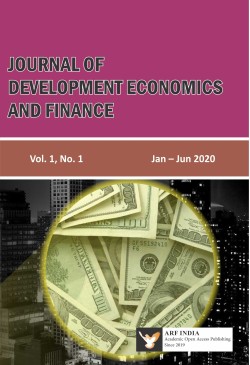
Journal of Development Economics and Finance
Frequency :Bi-Annual
ISSN :2582-5194
Peer Reviewed Journal
JOURNAL OF DEVELOPMENT ECONOMICS AND FINANCE - ISSN: 2582-5194 - is a double-blind, peer-reviewed academic journal publishing high quality conceptual and measure development articles in the all areas of Economics, Finance, Accounting and related disciplines.
The journal welcomes author from any institutional backgrounds and accepts rigorous empirical research paper with any methods or approach that is relevant to the Economics and Finance context or content, as long as the research fits one of three salient disciplines: Economics, Finance, Accounting related disciplines.
All papers submitted to JDEF undergo a rigorous peer review process by leading experts. The review process normally takes 4 to 8 weeks. When the review process is complete, the Editor-in-Chief will inform the author(s) about the results of the evaluation process. Based on each reviewer’s evaluation, the Editor will accept the manuscript for publication (without any improvement, with minor revision, or with major revisions) or will reject it.
Editor in Chief:
Guidelines to the Authors
Submitted papers should not have been previously published or be currently under consideration for publication in any other journals.
All papers will be reviewed through a peer-reviewed process.
Authors should submit their papers to the following email address: K.R.Bhattarai@hull.ac.uk; Kbhattar@gmail.com; jdef.editor@gmail.com
All names should be removed from the submitted paper.
A cover letter which includes the paper title and names of the authors should be submitted along with the submitted paper.
The paper should use Times New Roman, 12, A4 layout, 1.5-line space.
Abstract: The abstract should be a total of about 200 words maximum. The abstract should be a single paragraph and should follow the style of structured abstracts, but without headings: 1) Background: Place the question addressed in a broad context and highlight the purpose of the study; 2) Methods: Describe briefly the main methods or treatments applied. Include any relevant preregistration numbers, and species and strains of any animals used; 3) Results: Summarize the article's main findings; and 4) Conclusion: Indicate the main conclusions or interpretations. The abstract should be an objective representation of the article: it must not contain results which are not presented and substantiated in the main text and should not exaggerate the main conclusions.
Keywords: Three to ten pertinent keywords need to be added after the abstract. We recommend that the keywords are specific to the article, yet reasonably common within the subject discipline and three-five JEL classification codes.
All sections and subsections should be numbered in Arabic numerals.
Paragraphs should be indented in the manuscript to avoid ambiguities when a line ends on a full stop.
Figures and tables should be numbered consecutively and have a self-explanatory short title. Avoid color figures and the use of vertical lines in tables.
All equations (expect for very short ones) should be displayed on a separate line. Equations which are cited in the main text should be numbered consecutively on the right margin, using Arabic numerals in parentheses.
Footnotes are not allowed (except for the one of point 4).
References should be listed alphabetically by author at the end of the paper and referred to in the body of the ext by Name (year). The references’ list should be prepared according to the following examples:
Journals paper
Srinivasan, V. and Shocker, A. D. (1973), “Linear Programming Techniques for Multidimensional Analysis of Preferences”, Psychometrical, 38 (3), 337-396.
Monographs:
Elton, E. J. and Gruber, M. J. (1987), Modern Portfolio Theory and Investment Analysis (3nd edition), John Wiley, New York.
For contributions to edited volumes:
Strunk, Jr., W., White, E.B.,( 2000) The Elements of style, fourth ed. New York: Longan.